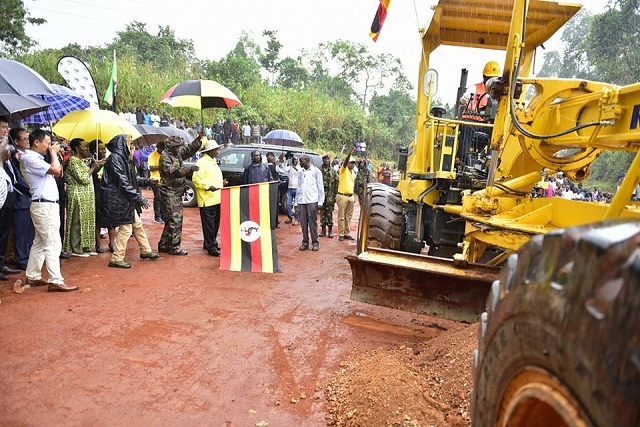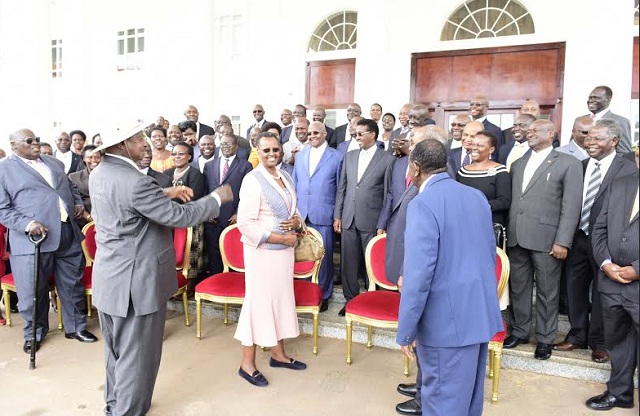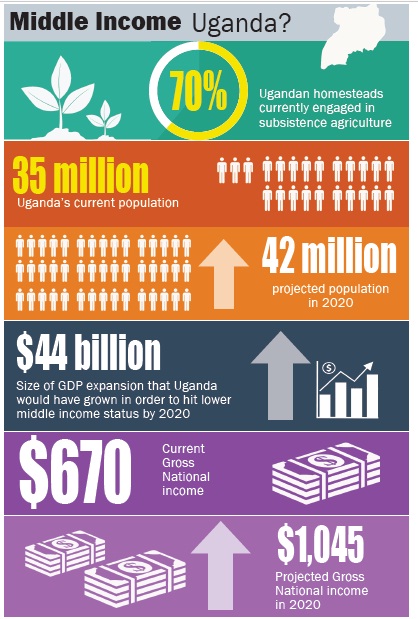Achieving middle-income status in 5 years: Museveni’s latest politicking joke or a realistic national target?

ANALYSIS:
When President Yoweri Museveni took the oath of president for the sixth time on May 12 at Kololo Ceremonial Grounds in Kampala, he had one goal clearly on his mind: delivering Uganda to the middle income bracket by 2020.
“As projected by the National Planning Authority (NPA), the middle income status will be attained by 2020,” he said at his swearing in ceremony. (CLICK here FULL INAUGURATION SPEECH)
When he organised a luncheon at State House Entebbe on May 4 to thank his outgoing Cabinet, Museveni also commended them for ‘almost’ taking Uganda to middle income status.
Sounding optimistic, he said his next term will be much easier, thanks to an expected windfall of oil export dollars.
“By 2019 we shall be getting our oil money. Things that we did by borrowing like infrastructure will be done more easily with our own money,” he said, “We have finished the issue of the pipeline and [we] are going to start exporting our oil.”

According to the World Bank, in the last decade alone, countries that have transited into middle-income status have been boosted by discovery of oil, thanks to global demand especially from China. But some have benefited from a reduction in conflict, structural and political reforms.
The International Monetary Fund (IMF) says effects of the current drop in oil prices could affect the global economy beyond 2018 because such drops in commodity prices often cause negative ripple effects for several years.
Museveni told his outgoing Cabinet that Uganda’s GDP would grow at 6.14% and per capita income rise to $1,039 by 2019 and this would essentially make Uganda leap into the lower-middle income bracket. Museveni could be right.
But just a day before, while speaking in Kampala during the release of the 2016 Regional Economic Outlook report titled: “Sub-Saharan Africa: Time for a policy reset”, the IMF Director for Africa, Antoinette Sayeh had cautioned Uganda against pinning its middle income dream on anticipated oil money. Sayeh cautioned that oil prices are likely to rise slowly and a barrel of oil is unlikely to reach $60 by 2020.
Another economist, Annet Kuteesa, a research fellow, at Makerere University’s Economic Policy Research Institute (EPRC) also says it would not be a good idea to bank on oil because Uganda’s oil reserves will not last a long time.
“Our reserves are very low and will probably last us 20-30 years,” she said, “Oil money will never be enough because our demands as a country are ever-growing.”
Kuteesa says if oil revenues must be relied upon to propel the economy, they must be invested in sectors that have a multiplier effect, including infrastructure, manufacturing, agriculture, and tourism.
Kuteesa’s pessimism is shared by others like Fred Muhumuza; a development economist who thinks the talk of Uganda achieving middle income status by 2020 is a ‘politicking joke.’
“There cannot even be first oil in 2019,” he told The Independent on May 8.
He says for Uganda to reach the minimum threshold of lower middle income, the government would need to generate a GDP of US$ 43.89 billion; an increase of 78% over the next five years. That would have to contend with a population growth rate that adds at least 1.15 million people every year, onto its current 35 million. Uganda would, therefore, hit the 42 million mark in 2020.
“I am yet to see plans of what it will take to get the population to US$ 1,045. There is not even a discussion of the social, economic, institutional and political reforms required to revive the economy.
“With 30% of Ugandans under the international poverty line of less than US$ 1.25 per day, and 63% of Ugandans being vulnerable, the journey to middle income status looks very doubtful,” he says.
But why is attaining middle-income status such a big deal to President Museveni? Isn’t his timeline too ambitious?
“We do not have enough evidence to answer the question,” says Muhumuza, “because we have not even started to discuss the basics.”
Muhumuza says the journey to middle income status is not simply an economic issue to be addressed through the National Development Plan but has significant political, institutional and social aspects.

The real deal or joke?
As the debate rages, officials at the National Planning Authority (NPA)—the agency responsible for charting Uganda’s economic growth path—have set 2020 as the magic date for Uganda to achieve Middle Income Status.
Wilberforce Kisamba Mugerwa, the NPA’s board Chairman says the target is achievable. He points out that GDP growth was a modest 3.1% in 2000 but has since moved up to 5.0% with per capita income rising to over $ 600 from just under $300 at the turn of the millennium.
The NPA plan contains structural transformation benchmarks to ensure that resources are re-allocated from less to more productive sectors.
 The Independent Uganda: You get the Truth we Pay the Price
The Independent Uganda: You get the Truth we Pay the Price




It is as imposible an it be to attain a middle income status in 2020, but anyway why doesn’t the presedendent concentrate on knowledge creation rather than chase wild dreams that may not materialise soon, wealth creation can not create knowledge but knowledge can create wealthy. So forget middle income status and first concentrate on knowledge creation.
Oil money should be seen as a bonus that will compliment growth, but not a key driver to growth, it is only strategic abilities that will give uganda strategic competence which will then put the country in a competitive position, this will eventually lead to gaining a competitive advantage over our neighbours in trading.
THIS is just something else to use to hang onto power citing “unfinished business”.As Bantu rightly says , we have had “comparative advantage” that we have not made use of for the last 30 years and now we are talking about KIIRA cars.That informs the strategy we have and as they say ” a fortune in the hands of a fool is a big MISFORTUNE”. From “MY OIL” we are now talking about “our oil” which leaves one to wonder when the transformation took place, because I have not heard of a flotation of shares whereby the hitherto private company of M 7 OIL SARL floated its shares and THE REPUBLIC OF UGANDA bought some.
OIL or no oil, I do not see us going anywhere in a hurry ,unless there is a change of management.
Leadership is about inspiration and maintaining confidence of he followers. For the faithful both inside and outside the country who can be inspired to strategies and work hard -not speculation; and depending on their numbers plus their abilities, it is a possible goal to achieve and be in the middle income bracket soon. Even if we missed the target, but having stretched as much as possible, that would still be ok. Everyone aspires to be rich. Let him go on the work of positive mobilizing of ALL including the opposition to participate effectively. We might attain.
You guys, I salute you both kamanyire and ejakait, for your input in these forums, also say keep it up, you are doing good job, to open people’s eyes, and I like it that your always active debenting and commenting.